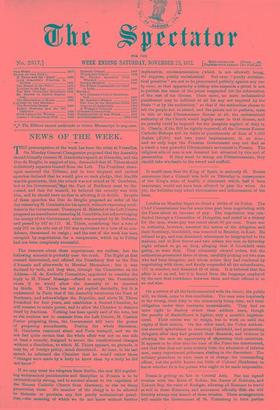If we may trust the telegram from Berlin, the new
Bill regulat- ing ecclesiastical punishments and discipline in Prussia is to be extraordinarily strong, and to amount almost to the expulsion of the Roman Catholic Church from Germany, or else its sharp persecution there. No member of the clergy is to be allowed to threaten or proclaim any but purely ecclesiastical penal- ties,—the meaning of which we do not know without further
explanation, excommunication (which is not allowed) being, we suppose, purely ecclesiastical. But even "purely ecclesias- tical penalties" are not to be pronounced publicly against any one by name, so that apparently a bishop who suspends a priest is not to publish the name of the priest suspended for the information of the rest of his diocese. Once more, no mere ecclesiastical punishment may be inflicted at all for any act required by the State "or by the authorities," so that if the authorities choose to tell the people not to attend, and the priests not to perform, mass in this or that Ultratnontane diocese at all, the ecclesiastical authority of the Church would legally cease in that diocese, and no penalty could be imposed for the complete neglect of duty in it. Clearly, if the Bill be rightly reported, all the German Roman Catholic Bishops will be liable to punishments of fines of 1,000 thalers (£150) and two years' imprisonment, in no time ; and we only hope the Prussian Government may not find as a result a very powerful Ultramontane movement in Prussia. The religious side of man is not deterred but attracted by this sort of persecution. If they want to stamp out Ultramontanism, they should take wholesale to the sword and scaffold.


































